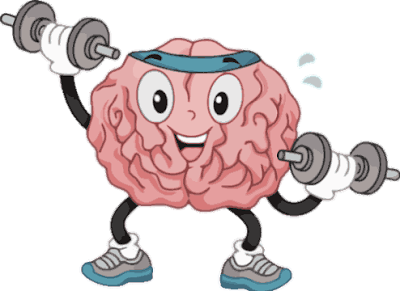Essential Nutrients for Brain Health: Unlock Your Mental Clarity
Have you ever wondered why you feel mentally sluggish after a few days of poor eating? Or why do certain foods seem to give you more mental clarity?
The connection between what you eat and how your brain functions is about more than having enough energy. It's about providing your brain with specific nutrients to perform its best.
Today, we're starting a new series on nutrition and well-being, beginning with the essential nutrients your brain needs to function optimally. Understanding these nutrients helps you build a resilient brain to handle life's challenges better.
Why Is Your Brain So Demanding When It Comes to Nutrition?
Though it only makes up 2% of your body weight, your brain uses about 20% of your body's energy. But it's not just about calories. Your brain needs specific nutrients to:
- Maintain its structure
- Produce neurotransmitters
- Protect itself from damage
Let’s break down the important nutrients for brain health and how you can incorporate them into your diet.
1. Omega-3 Fatty Acids for Cognitive Function and Memory
Think of omega-3s as essential nutrients for your brain health. About 60% of your brain is made of fat, with DHA being one of the most important building blocks of brain cell membranes.
Benefits of Omega-3s:
- Helps keep cells healthy
- Facilitates smooth communication between brain cells
- Supports memory and learning
- EPA reduces inflammation and supports brain metabolism
Together, these omega-3s play crucial roles in maintaining optimal brain function and may help protect against mood disorders.
Food Sources of Omega-3s:
- Animal-based: Fatty fish like salmon, sardines, and mackerel
- Plant-based: Chia seeds, flaxseeds, and walnuts
Incorporation tips:
- Add fatty fish to your meals a couple of times a week
- Sprinkle chia seeds or flaxseeds onto your breakfast for an omega-3 boost
2. B Vitamins for Stable Mood and Mental Energy
B vitamins, including B6, B12, and folate, are essential for producing neurotransmitters—the brain's chemical messengers.
Benefits of B Vitamins:
- Help with energy production
- Enhance mental clarity
- Support a stable mood
A deficiency in B vitamins can lead to fatigue, irritability, and even memory problems.
Food Sources of B Vitamins:
- Animal-based: Leafy greens, eggs, dairy, lean meats
- Vegetarian and vegan options: Fortified cereals and plant-based milk (especially for B12)
Incorporation tips:
- Try an omelet with spinach and mushrooms in the morning for a B vitamin-rich meal
3. Antioxidants for Protection Against Oxidative Stress
Antioxidants like vitamins C and E help protect the brain from oxidative stress—damage to cells caused by environmental and internal factors.
Benefits of Antioxidants:
- Reduce wear and tear on brain cells
- Help prevent aging and cognitive decline
Food Sources of Antioxidants:
- Vitamin C: Berries, citrus fruits, leafy greens
- Vitamin E: Nuts and seeds (almonds, sunflower seeds)
Incorporation tips:
- Snack on berries or an orange for vitamin C
- Add nuts or seeds to a salad or oatmeal for a dose of vitamin E
4. Magnesium for Stress Management and Brain Plasticity
Magnesium is a mineral that helps regulate brain plasticity—the brain's ability to change and adapt. It also plays a key role in managing the brain's response to stress.
Food Sources of Magnesium:
- Leafy greens
- Nuts and seeds
- Whole grains
Incorporation tips:
- Snack on a handful of nuts
- Add whole grains like quinoa or brown rice to your meals
5. Zinc and Iron for Focus and Oxygen Supply
Though less popular, zinc and iron are crucial minerals for brain health:
- Zinc: Regulates neurotransmitters and supports memory function
- Iron: Essential for transporting oxygen to the brain
Deficiency Risks:
- Focus issues
- Mood disturbances
Food Sources of Zinc and Iron:
- Zinc: Shellfish, meat, pumpkin seeds
- Iron: Spinach, lean meats, legumes
Incorporation tips:
- Add beans or lentils to your meals to iron
- Snack on pumpkin seeds for both zinc and magnesium
Practical Tips for Incorporating Brain-Healthy Foods
Build a Brain-Healthy Plate
Aim for balance:
- Half your plate: Colorful fruits and vegetables
- One-quarter: Lean proteins (like fatty fish at least twice a week)
- One-quarter: Whole grains
Snack Smart
Keep nuts, seeds, and fresh fruits on hand for quick, brain-boosting snacks.
Plan Your Meals
Meal planning ensures you’re getting a variety of brain-healthy nutrients throughout the week.
Consider Supplementation
Sometimes, supplementation is necessary, especially for:
- Vitamin B12 if you follow a vegan diet
- Omega-3s if you don’t eat fish
Always consult a healthcare provider before starting a new supplement regimen.
The Long-Term Benefits of a Brain-Healthy Diet
Powering up your mind through nutrition is an impactful way to support your mental well-being and cognitive function. By focusing on nutrients like omega-3 fatty acids, B vitamins, antioxidants, and key minerals, you can give your brain the fuel it needs to perform at its best. The benefits extend far beyond immediate effects. Consistently nourishing your brain with these essential nutrients is an investment in your long-term cognitive health and emotional resilience.







